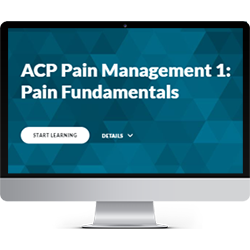Pain Management Learning Series
This interactive training series consists of 7 core modules and 2 sets of case studies.
Pain Management 1: Pain Fundamentals establishes key terminology used throughout the learning series, highlights the epidemiology of chronic pain, explores its personal and societal effects, and identifies related ethical challenges faced by health care workers. After completing this module, learners will be able to:
- Apply commonly accepted frameworks to describe and identify the type(s) of pain your patients are experiencing.
- Discuss the proportion of American adults who will present with pain.
- Differentiate acute pain, the disease of chronic pain, and high-impact chronic pain.
- Describe factors that can increase someone’s risk for developing chronic pain.
- Describe the impacts of chronic pain on your individual patients, their families, and society at large.
- Incorporate 6 ethical considerations when caring for individuals with chronic pain.
The 2024 rerelease of ACP's modules within the Pain Management Learning Series includes updated information and provides additional learning and credit earning opportunity for learners who claimed credit for earlier versions.
Modules and CME/MOC credit are free to ACP Members. Non-members may purchase access to claim CME/MOC credit for each module for $25 or the full package of 7 learning modules and 2 sets of case studies for $199 by clicking “Learn More/Buy”. Non-members who do not purchase the module will not receive credit upon completion of the module.
The ACP Pain Management Learning Series is supported by an independent education grant funded by Pfizer, Inc., in partnership with Lilly USA, LLC.
CME/MOC:
Up to 1
AMA PRA Category 1 Credits ™ and MOC Points
Expires April 04, 2027
active
Cost:
Free to Members
Format:
Interactive Multi-Media
Product:
Pain Management Learning Series
This self-paced, comprehensive, multimedia series comprises 7 core learning modules, 2 case-based modules, and additional resources with over 23 hours of learning activities. It provides interactive and engaging training in pain assessment, nonpharmacologic treatment, nonopioid pharmacotherapy, rational use of opioids, and management of patients with both pain and opioid use disorder. With an emphasis on evidence-based communication skills, this series is designed to support patient partnership and successful navigation of chronic pain management challenges.


